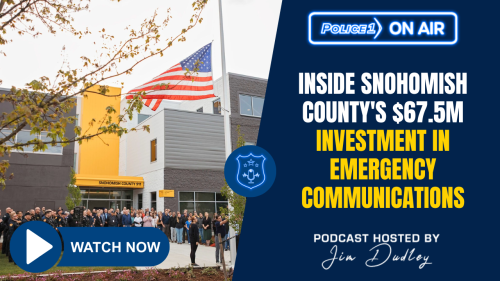Download this week’s episode on Apple Podcasts, Amazon Music, Stitcher, Spotify or via RSS feed, and watch the video version on Police1’s YouTube channel.
In this episode of Policing Matters, host Jim Dudley welcomes Thor Eells, Executive Director of the National Tactical Officers Association (NTOA).
With over 30 years of experience in law enforcement, Eells shares his expertise on current NTOA activities and trends in SWAT training and deployment. He discusses challenges facing tactical teams today, including civil unrest, evolving standards for SWAT teams and the importance of regional cooperation among agencies.
The conversation also explores the implications of recent legislation on law enforcement practices and the role of advanced technology in enhancing tactical training and operations.
About our sponsor
LETS Corp is the technology company behind LETS Respond, one of the most sought-after smart solutions by law enforcement to prevent and de-escalate crises. Endorsed by law enforcement agencies from LA to New York, LETS Respond helps bring enhanced awareness and safer resolutions in response to hostage/crisis situations. With LETS Respond, you’ll instantly save costs, and improve time to response and resolution, without ever needing to deal with the hassle of setting up a throw phone. Explore the benefits by visiting letscorp.us/respond today.
About our guest
Commander Thor Eells served over 30 years with the Colorado Springs (Colo.) Police Department. His assignments with the department included operator, team commander and division commander. As commander of the Specialized Enforcement Division, he was responsible for highly specialized units such as SWAT, K9, EOD, traffic enforcement, special events and air support.
He is a FBI National Academy and Center for Creative Leadership graduate. Eells has taught extensively for the NTOA and is one of the core instructors of the SWAT Command and Leadership courses. He has represented the NTOA in the Department of Homeland Security’s efforts to develop SWAT capabilities and helped develop the National SWAT Standard.
Eells is a recipient of the NTOA’s prestigious John Kolman Award of Excellence and has been awarded his department’s Distinguished Service Medal. He has served on the NTOA Board of Directors for seven years and was board chair for two years. After retiring from the Colorado Springs Police Department in June 2017, he assumed the role of executive director for the NTOA.
Key quotes from this episode
- On civil unrest response: “A SWAT team is not a crowd control team, and we’re not necessarily equipped the same way to be safe in different environments, but unfortunately SWAT teams are often the one unit that command staff think is a discretionary resource to be thrown at any particular problem.”
- On command-level decision-making: “Frequently when you look at a lot of the failures in after-action reports, it occurs at the command level, not because they’re not smart people or that they’re not well-intended, but often it’s a result of them not knowing what either the full capabilities are or not knowing what the full limitations are and then kind of navigating within those guidelines of how to make those proper decisions.”
- On risk mitigation: “Anytime we’re entering into the bad guy’s structure there are always potential unknowns and risk factors. It’s a process that requires awareness and humility to acknowledge that maybe the way we’ve been doing this isn’t the best and we should change our ways. Leadership plays a big part in helping guide teams and having these conversations before a critical incident, not in the midst of it, is key.”
- On new technology: “The improvement in technology, like drones and virtual reality, has a significant impact on tactics and training. It’s almost routine now that you have some sort of robotic UAV, a bomb robot, or different tactical robots specifically designed for the tactical environment to be inserted to gain intelligence, improve situational awareness and establish communication. Teams are now assigning drone operators to improve the utilization of these tools in various scenarios. We need to pay attention to the improvements in technology, as they are becoming more affordable and have multiple uses beyond just SWAT operations.”
- On developing legislation: “An incident that might happen in a certain area can have dramatic effects on policing in different parts of the country, where states are quick to pass legislation limiting the utilization of specialty impact munitions in crowd control scenarios or the use of chemical agents. While I understand the emotion in why this takes place, it’s very, very shortsighted. Taking away tools that allow us to stay 300-400 feet away from people and minimize the potential for injury or violence actually increases the danger to everybody involved. The actual practical consequences of those decisions are not favorable; they’re actually harmful.”
Key takeaways from this episode
- Civil unrest and SWAT deployment: SWAT teams are increasingly involved in public order scenarios, highlighting the need for specialized training and equipment.
- Regional cooperation: Multi-jurisdictional cooperation and resource sharing are essential for effective tactical responses, especially for smaller agencies.
- Risk mitigation: Thorough risk assessment and mitigation strategies are crucial in planning tactical operations to minimize risks for all involved.
- Leadership in tactical operations: Effective command decision-making is vital, and leaders must rely on the expertise of well-trained tactical operators.
- Advancements in technology: The integration of drones, virtual reality and AI in training and operations is enhancing situational awareness, decision-making and overall effectiveness in tactical scenarios.
Additional resources from the National Tactical Officers Association
- Tactical Response and Operations Standard
- NTOA Public Order Response and Operations Standards
- NTOA Position Statement: No-Knock Warrant Service
Upcoming NTOA events:
- National Law Enforcement Operations Conference, September 8-13, Kansas City, Missouri
- National Crisis Negotiations Conference, October 27-31, Phoenix, Arizona
Rate and review the Policing Matters podcast
Enjoying the show? Please take a moment to rate and review us on Apple Podcasts. Contact the Policing Matters team at policingmatters@police1.com to share ideas, suggestions and feedback.








